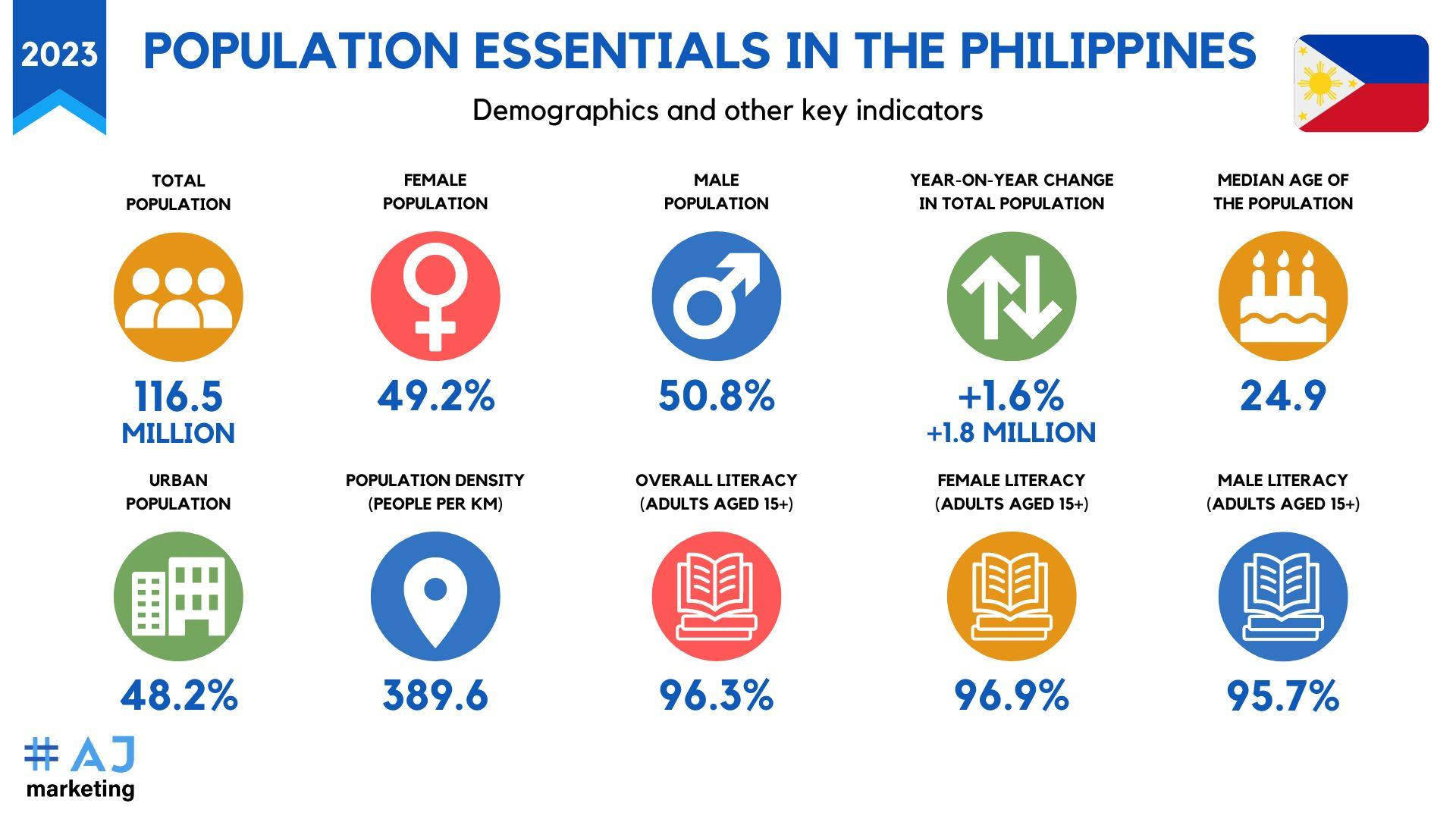
Hello, business enthusiasts! Here, we’re all about helping you navigate new business landscapes and today, we’ve got something that’ll pique your interest – venturing into the ever-vibrant Philippine market.
Why the Philippines, you ask? Well, let’s paint a picture for you. Imagine a tropical paradise, where the sun shines a little brighter, and the bustling markets are as colorful as the coral reefs that adorn the country’s coastlines. Now, put your entrepreneurial dreams into this setting, and voilà, you’ve got a thrilling business adventure waiting to unfold.
In this guide, we at AJ Marketing are about to embark on a journey, exploring everything you need to know to launch your business in the Philippines. So, buckle up, and let’s dive in. Welcome aboard, future business tycoons!
What You Need to Know About Starting a Business in the Philippines:
- The Pearl of the Orient: Why the Philippines is a Treasure Trove for Business Ventures
- Navigating the Legal Labyrinth: Your Guide to Business Registrations and Laws in the Philippines
- Location, Location, Location: Finding Your Business’ Perfect Philippine Home
- The Filipino Connection: Mastering Business Etiquette and Culture in the Philippines
- Dodging Dragons: Overcoming Challenges in Your Philippine Business Journey
1. The Pearl of the Orient
Why the Philippines is a Treasure Trove for Business Ventures

We at AJ Marketing believe the Philippines—a nation of over 116.5 million souls—is a gem worth discovering for your business pursuits.
First off, let’s talk about the people, the heart and soul of the country. With nearly half the population (48.1%) living in urban areas, the Philippines offers a vast market teeming with potential customers. City-dwellers in this archipelago are known for their love of shopping, dining, and entertainment, presenting ample opportunities for businesses in various sectors.
But it’s not just about quantity here. The quality of the workforce is equally impressive. A noteworthy 96.3% literacy rate is a testament to the country’s well-educated populace. What’s more? English is one of the official languages, making communication a breeze for international business folks like you.
The Philippines is also renowned for its youthful demographic, with a median age of 24.9 years old. This young, tech-savvy crowd is always ready to embrace new ideas and innovations, making it an ideal target audience for businesses looking to introduce novel products or services.
Now, beyond the people, the Philippines’ strategic geographical location is an ace up its sleeve. Positioned in the heart of Southeast Asia, it serves as a gateway to over 600 million consumers in the ASEAN market. So, a business in the Philippines isn’t just about tapping into the local market; it’s about gaining access to a regional stage.
Intriguing, isn’t it? This Pearl of the Orient, with its thriving cities, literate and youthful populace, and strategic location, is indeed a treasure trove of business opportunities. So, are you ready to explore further? Because we’re just getting started!
2. Navigating the Legal Labyrinth
Your Guide to Business Registrations and Laws in the Philippines

Navigating the legal landscape of a new country can be a tad bit intimidating, but don’t worry, we at AJ Marketing are here to guide you every step of the way. Let’s decode the key laws and steps you’ll need to be aware of to register and run your business in the Philippines.
A. Key Laws to Know
- Employment and Labor Law – The Labor Code of the Philippines (Presidential Decree No. 442) outlines the rights and obligations of both employers and employees. It covers everything from working hours to benefits and dismissal procedures.
- Finance Law – The Tax Reform Act of 1997 (Republic Act No. 8424) and the Securities Regulation Code of the Philippines (R.A. No. 8799) govern the financial operations of businesses, including taxation and securities regulation.
- Foreign Workers and Employee Eligibility – The Foreign Investments Act of 1991 (R.A. No. 7042) provides guidelines for foreign investment and the employment of foreign nationals.
B. Steps for Foreign Company Registration
- Securities and Exchange Commission (SEC) – Start with company name verification, followed by the preparation and registration of incorporation documents. After that, you’ll need to acquire a Community Tax Certificate.=
- Business Permit and Employment Registration – Apply for Barangay or District clearance, which is required before the issuance of the business permit. Once you have the permit, register your employees with the social security system, health insurance, and the Home Development Mutual Fund.
- Bureau of Internal Revenue (BIR) – Complete your tax registration, purchase accounting books, and get your receipts and invoices printed. The BIR will also need to stamp your papers and receipts.
Keep in mind that the processing time for foreign company registration usually lasts for 2-3 months.
Yes, it may sound like a labyrinth at first glance, but with careful planning and a little patience, you’ll find your way. Plus, you’re not alone in this! We at AJ Marketing are here to help you navigate through, ensuring your venture into the Philippines is as smooth as a tropical breeze. Next up, we’ll help you find the perfect Philippine home for your business. Exciting, isn’t it?
3. Location, Location, Location
Finding Your Business’ Perfect Philippine Home

If real estate has taught us anything, it’s that location is everything. But don’t worry, we at AJ Marketing have got you covered. The Philippines, with its rich tapestry of cities and regions, offers a smorgasbord of locations that could be the perfect home for your business. Let’s tour some of these possibilities together.
First up, we have the bustling metropolis of Manila, the capital city. A veritable melting pot of cultures, commerce, and endless hustle and bustle, Manila could be the perfect spot if your business thrives in a fast-paced, urban environment.
Looking for something a bit more laid back? Why not consider the charm of Cebu City? Known as the “Queen City of the South,” Cebu is a thriving hub of commerce and industry, all wrapped up in a more relaxed, island-lifestyle package.
Perhaps you’re in the tech industry? Then you might want to set your sights on Davao City. Known as the “Silicon Gulf,” Davao is quickly becoming a hotspot for IT and tech-based businesses, thanks to its skilled workforce and supportive local government policies.
And let’s not forget the growing business hubs in Clark and Subic. These former military bases turned economic zones offer attractive incentives for businesses, with their strategic location, modern infrastructure, and investor-friendly policies.
Deciding on the right location is a matter of matching your business needs with the unique characteristics of these locations. Consider factors like your target market, accessibility, cost of doing business, and availability of resources. And remember, the perfect location is not just about finding a place to set up shop—it’s about finding a community and a culture that aligns with your business values and goals.
Stay tuned, as we’re just about to dive into the captivating world of Filipino business culture. Trust us, it’s a journey you don’t want to miss!
4. The Filipino Connection
Mastering Business Etiquette and Culture in the Philippines

Navigating a new business landscape is more than just understanding laws and regulations—it’s about understanding the people and their culture. We at AJ Marketing believe that diving into Filipino culture is as exciting as exploring the archipelago’s stunning islands. So let’s embark on this cultural journey together.
A. Reliance on God
Filipinos are deeply religious, with a majority being Roman Catholic. Their faith is not just confined to places of worship—it permeates their daily life, from observing Christian holidays to attending Bible groups in workplaces.
One concept that is deeply ingrained in the Filipino psyche is ‘Bahala na’, which loosely translates to ‘God Willing’. This philosophy is an expression of their trust in divine providence, a belief that what will be, will be. In business, this translates to being flexible, adaptable, and ready to face whatever comes their way.
B. Relationships & the Family
Filipinos are renowned for their strong sense of community, and at the heart of this community lies the family. The family unit is the most valued social structure in the country, and Filipinos will often prioritize family obligations over work demands.
But this sense of community extends beyond just the immediate family. Filipinos also value harmonious relationships within their broader social networks, including the workplace. In business, this means that Filipinos tend to lean towards harmony and avoid conflict, creating a peaceful and cooperative work environment.
C. Saving Face
In Filipino culture, ‘face’ or one’s reputation and self-respect, holds immense value. Understanding this cultural nuance is crucial, as relationships can be easily damaged if this concept is not respected.
The concept of ‘face’ is embodied in the Filipino value of ‘Hiya’, which refers to a sense of shame or embarrassment. Filipinos will often go to great lengths to avoid causing or experiencing ‘hiya’, even if it means not asking for help or admitting a lack of understanding. To be labeled as ‘walang-hiya’ or shameless is considered a grave insult.
As a foreign business entering the Philippines, it’s essential to respect these cultural values. Being sensitive to these cultural nuances will not only help you establish a successful business but also forge deep and meaningful connections with the Filipino people. After all, in the Philippines, it’s all about the connection.
5. Dodging Dragons
Overcoming Challenges in Your Philippine Business Journey
Just as in any heroic quest, starting a business in the Philippines comes with its own set of dragons to dodge. But fear not, brave entrepreneur, for we at AJ Marketing have charted the landscape and are here to guide you through these challenges.
A. Navigating Bureaucracy
Getting your business off the ground can often feel like navigating a labyrinth of bureaucracy. The multitude of processes, from registering your business to obtaining permits, can be time-consuming and complex. It’s important to familiarize yourself with these processes and be patient. Seek local advice and assistance to help streamline this process.
B. Understanding Cultural Nuances
As we’ve discussed, the Filipino business culture is rich and unique, rooted deeply in values of family, community, and religion. Misunderstanding or overlooking these cultural nuances can lead to miscommunication or even damage business relationships. To avoid this, invest time in learning about and respecting the local culture. Remember, in the Philippines, business is personal.
C. Navigating the Infrastructure
While major cities like Manila, Cebu, and Davao have modern infrastructure, it can be a different story in more remote areas. Limited access to reliable transportation, electricity, and the internet can pose challenges. Consider these factors when choosing your business location and plan accordingly.
D. Coping with Natural Disasters
The Philippines is prone to natural disasters like typhoons, earthquakes, and volcanic eruptions. Having a robust disaster management plan in place is crucial. This includes securing your physical assets, creating a contingency plan for business operations, and ensuring the safety of your employees.
E. Managing Language Barriers
While English is widely spoken in the Philippines, there can still be language barriers, especially when interacting with different local dialects. Hiring local talent who are fluent in both English and the local language can help bridge this gap.
An inspiring example of a brand that successfully overcome language barriers is Coca-Cola. Back in 2014, they launched their “Share a Coke” campaign in the Philippines, a country with over 170 languages. The challenge was to make the campaign resonate on a personal level with the diverse Filipino population.
Coca-Cola’s innovative solution was to print common Filipino names and terms of endearment on their bottles and cans, not only in Tagalog but also in various local dialects. This personalized approach sparked conversations and shared moments among Filipinos, creating a strong connection between the brand and its consumers.
Conclusion
Setting up a business in the Philippines is a rewarding journey. Navigate the landscape, respect the culture, and embrace challenges. With AJ Marketing, you’re never alone in your business adventure. If you wanna learn more, check out the AJ Marketing Blog.
https://youtu.be/l64qM1VghUk





